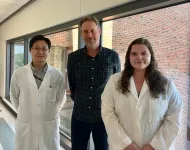(Press-News.org) Two new discoveries from the Dudley lab at UVA Cancer Center highlight the different roles of blood vessels in solid tumors – and the findings could help prevent breast cancer from spreading and enhance the effectiveness of one of the most important new cancer treatments in many years.
In one new scientific paper, researcher Andrew C. Dudley, PhD, and his team report that the effectiveness of immunotherapy drugs called immune check blockade is enhanced when blood vessels are targeted in a specific way. (Immunotherapy enhances the power of the immune system to fight cancer and other diseases.) In another paper, published soon after, Dudley and collaborators outline a finding that could help prevent breast cancer from metastasizing, or spreading to other parts of the body.
“Blood vessels can act both as good guys and bad guys in a growing tumor. On one hand, blood vessels are a passageway that allows special immune cells to enter the tumor, where they will hopefully find cancer cells and kill them. On the other hand, blood vessels act as a highway for cancer cells to enter the bloodstream and spread to distant sites in the body,” said Dudley, of the University of Virginia School of Medicine’s Department of Microbiology, Immunology and Cancer Biology. “Our work highlights the dual role that blood vessels can play in cancer that we hope will improve our understanding of how to best elicit anti-tumor immune responses or even prevent metastasis.”
Improving Cancer Immunotherapy
In the immunotherapy paper, Dudley and his team outline how the tumor vasculature – the blood vessels that feed a tumor – could be targeted to help immune cells enter the tumor and kill the cancer cells.
The researchers found that a particular enzyme, called DNMT1, is an important gatekeeper in blood vessels that determines whether anti-tumor immune cells can enter the tumor “microenvironment.” When the investigators disabled this enzyme only in the blood vessels, they found it reduced vessel growth and made the vessels more receptive to immune cell entry; this led to an improved response to immunotherapies.
By blocking this enzyme with drugs, doctors might be able to bolster the numbers of anti-tumor immune cells that can enter patients’ tumors and kill cancer cells. This approach could be combined with existing immunotherapy approaches to increase the number of patients who respond to the treatment, the researchers suggest.
“Blocking DNMT1 activity in cancer cells has recently been shown to bolster the efficacy of immunotherapies for cancer,” said Dudley. “But we’ve found that DNMT1 is also targetable in cancer-associated blood vessels, and blocking its function there seems to be equally important.”
PREVENTING METASTASIS
In the other paper, Dudley and his collaborators shed important new light on how breast cancer cells spread from the initial tumor site to other parts of the body, including the lymph nodes. These insights are particularly important because patients whose cancer spreads to the lymph nodes typically see worse outcomes – especially for breast cancer.
Dudley and his team found that highly metastatic breast cancer cells activate other types of cells, called fibroblasts, to “remodel” the surrounding environment so that cancer cells can escape the tumor, enter the lymphatic vessels, and spread to the lymph node. The researchers say that using drugs to interrupt this process early on could offer a way to prevent breast cancer from spreading.
“We’ve learned from this study how cancer cells can take advantage of non-cancerous cells in their surroundings and change their behavior in order to enter vessels and spread to different sites in the body -- especially the lymph nodes,” Dudley said. “Cancer really is a devious disease, and this is just one example of why it can be so difficult to treat. Therapies that target both the cancer cells and the non-cancerous cells that help the tumor along may prove beneficial in the long run.”
Dudley hopes his lab’s new findings will help advance the battle against cancer, a key mission of UVA Cancer Center, which has been designated one of only 54 Comprehensive Cancer Centers in the country by the National Cancer Institute. The NCI’s Comprehensive Cancer Center designation recognizes elite cancer centers with the most exceptional cancer programs in the nation. Comprehensive Cancer Centers must meet rigorous standards for innovative research and leading-edge clinical trials, positioning them at the leading edge of cancer care.
“Cancer doesn’t exist in a vacuum,” Dudley said. “In other words, cancer cells have this whole ecosystem or microenvironment where they thrive. We hope that by understanding how cancer cells exploit their microenvironment, we can perhaps develop new types of therapies, improve existing drug responses or even prevent cancer from spreading.”
Findings Published
Dudley and his collaborators have published their immune checkpoint blockade findings in the scientific journal Nature Communications. The team consisted of Dae Joong Kim, Swetha Anandh, Jamie L. Null, Piotr Przanowski, Sanchita Bhatnagar, Pankaj Kumar, Sarah E. Shelton, Erin E. Grundy, Katherine B. Chiappinelli, Roger D. Kamm, David A. Barbie and Dudley. Dudley reported no financial interest in the work; a full list of the other authors’ disclosures is included in the paper.
The metastasis findings have been published in the journal Cancer Research. That team consisted of Null, Kim, James V. McCann, Patcharin Pramoonjago, Jay W. Fox, Kumar, Lincy Edatt, Chad V. Pecot and Dudley. The researchers reported no financial interests in the work.
The metastasis work was supported by the National Cancer Institute, awards F31CA247407-02, T32CA009109, 2R01 CA177875, R01 CA2558451 and 5P30CA044579; the American Cancer Society, award 129755-RSG-16-176-DDC; the Melanoma Research Alliance, award ID612638; and UVA’s Emily Couric Cancer Center and the UVA Genome Analysis and Technology Core.
The immune checkpoint blockade research was supported by the National Cancer Institute, awards 2R01 CA177875, R01 CA2558451, R01 CA248930, U01CA214381 and U54CA261694; a National Institutes of Health postdoctoral fellowship, K00CA212227; the American Cancer Society, award 129755-RSG-16-176-DDC; the Melanoma Research Alliance, award ID612638; and UVA’s Emily Couric Cancer Center.
To keep up with the latest medical research news from UVA, subscribe to the Making of Medicine blog.
END
Cancer discoveries could enhance immunotherapy, breast cancer care
2023-06-05
ELSE PRESS RELEASES FROM THIS DATE:
Refining surge protector in crops could boost yields
2023-06-05
Awash in a rowed sea of its brethren, a corn leaf relegated to the lowest rung of its stem spends much of a June afternoon doused in shade cast by the higher-ups.
Then a gust begins pushing, pulling and twisting the waxy wings in concert, cracking a window to the fireball roiling 93 million miles away. It’s a prime, precious opportunity for photosynthesis to transform the sunlight into food. Unfortunately, the photosynthetic equivalent of a surge protector — one evolved to help plants mitigate damage driven by sudden spikes of high-intensity light — is slow to reset after so much time in the shade. The gust dissipates, the moment ...
Moving towards a more inclusive approach to medicine
2023-06-05
Moving towards a more inclusive approach to medicine
Release of pangenome representing wide diversity of individuals ushers in new understanding of human biology and disease
The first human genome, which has served as the reference until now, was released approximately 20 years ago. It was a landmark accomplishment that had a huge impact on biomedical research and changed the way scientists study human biology. But it was based on just a few individuals and did not capture the full genetic diversity of the human population.
An important step forward for both biology and biomedical research
“Since ...
SwRI investigates accuracy of flow meters measuring hydrogen and natural gas blends
2023-06-05
SAN ANTONIO — June 5, 2023 —Southwest Research Institute is expanding its flow meter research in collaboration with NYSEARCH, a nonprofit research and development organization for the gas industry, to address the impact of introducing hydrogen and natural gas blends into the residential and commercial energy mix. In the second phase of the program, SwRI will expand its research in measuring the energy content of blended gas to determine the accuracy of current flow meter technology for monitoring usage in homes.
Natural gas is widely used to power appliances and heat ...
Social media posts can be used to track individuals’ income and economic inequalities
2023-06-05
Researchers from Queen Mary University of London analysed 2.6 million posts on popular social media network Nextdoor and accurately predicted individuals’ income by solely examining the posts they’ve published. Striking differences in the content shared by people who live in wealthier versus poorer neighbourhoods has led researchers to believe that our general online posting activity, beyond Nextdoor, can reveal our socioeconomic status, making user profiling possible.
Knowing users’ income could allow social media platforms to recommend income-based content, and advertisers and online shops can target people based on their ...
ASCO: Targeted therapy achieves responses across multiple cancer types with FGFR alterations
2023-06-05
ABSTRACTS: 3121, 4504, LBA4619
CHICAGO ― Three clinical trials led by researchers at The University of Texas MD Anderson Cancer Center demonstrated positive results from the targeted therapy erdafitinib for patients with multiple tumor types harboring FGFR alterations. The data are being presented at the 2023 American Society of Clinical Oncology (ASCO) Annual Meeting.
Erdafitinib is an oral medication that blocks the activity of FGFR signaling proteins, which are important for a variety of normal cellular processes. However, FGFR genetic alterations can drive the development of many ...
Patchwork of mutations contributing to bipolar disorder
2023-06-05
Bipolar disorder (BD) is a major psychiatric condition that afflicts about 1% of people. Symptoms of BD include sudden onset of depressive mood with loss of interest which alternates with a manic state of hyperactivity. The suffering of the patients and societal cost of this disorder requires the use of continued therapeutic management. Current medications—although vital for patients with BD—are not perfect solutions, given their potential side-effects and treatment resistance. This necessitates ...
Zap Energy charts roadmap for measuring fusion gain
2023-06-05
In the race to develop fusion energy, each unique approach requires its own specialized techniques to determine net energy gain, an equation balancing energy in and out that’s known by the letter Q.
A new paper, published today in the journal Fusion Science and Technology, establishes the company’s method of measuring and calculating Q in Zap’s sheared-flow-stabilized Z-pinch fusion plasmas. The publication will be an important part of Zap demonstrating energy gain on the way to building a commercial fusion ...
Children with attention, behavior problems earn less money, have less education, poorer health as adults
2023-06-05
Children who struggle with attention and behavior problems tend to end up earning less money, finish fewer years of school and have poorer mental and physical health as adults, compared with children who don’t show early attention and behavior problems, according to research published by the American Psychological Association.
Children who struggle with attention are particularly likely to have lower levels of educational attainment as adults, while those who struggle with impulsivity are more likely to end up in trouble with the law, the research found.
“Our study found broad support ...
Previously unknown antibiotic resistance widespread among bacteria
2023-06-05
Genes that make bacteria resistant to antibiotics are much more widespread in our environment than was previously realised. A new study, from Chalmers University of Technology and the University of Gothenburg in Sweden, shows that bacteria in almost all environments carry resistance genes, with a risk of them spreading and aggravating the problem of bacterial infections that are untreatable with antibiotics.
“We have identified new resistance genes in places where they have remained undetected until now. These genes can constitute an overlooked threat to human health,” says Erik Kristiansson, a professor in the Department ...
New INSPIRE group data shows “long COVID” not a single condition
2023-06-05
The latest data from the nationwide INSPIRE study assessing the long-term symptoms and outcomes of the COVID-19 virus in nearly 6000 participants identifies four clinically distinct symptom presentations (phenotypes),adding to the growing body evidence that Long COVID is not singular condition but rather a range of conditions that may evolve, and typically improve, over time.
Lead author Michael Gottlieb, MD, says this better understanding of the clinically distinct manner that patients experience post-COVID -19 complications ...








